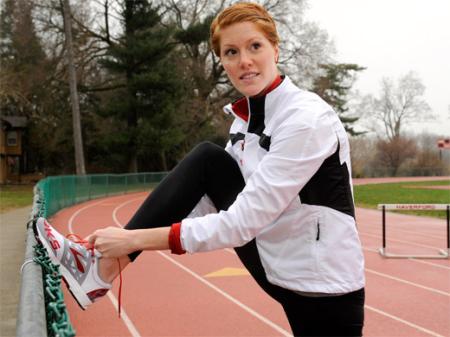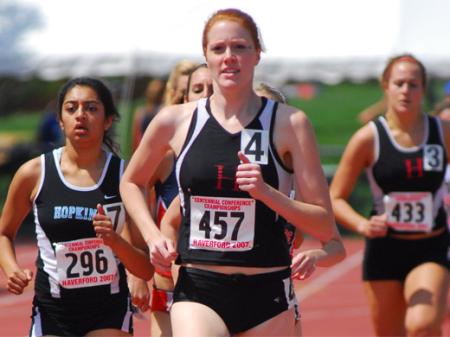By Erin Seglem
Even on a crowded track, it’s easy to pick out Annick Lamar. In a slightly pixilated video taken at the New Balance Boston Twilight meet last June, the Haverford College graduate is immediately recognizable. Her blazing red hair and long legs set her apart from the rest of the field.
Off the track, she is the assistant coach for the Haverford College Women’s Cross-country team. Those who know Lamar would describe her as funny and energetic, bringing a necessary positive spirit to practice. As she pushes back a lock of red hair, she laughs, “This is my eighth season of cross country and I couldn’t be happier.”
Lamar graduated from Haverford in 2008. Despite of health struggles during her freshman year, Lamar went on to set school records. With guidance from Haverford’s head coach Fran Rizzo, she earned All-American status in cross country as well as in track, twice in the 800-meter run and once in the mile. After college, she raced at the
USA Track and Field National Championships as well as for Team USA at the Pan-American games. Now, Lamar is looking to next summer’s Olympic trials. Reaching this level is rare for athletes whose careers flourished in Division III rather than Division I.
Her decision did not come without anxiety. “There was a weird feeling that I wasn’t doing something good enough, or fancy enough, for Haverford’s education.” After her recent appearance at the national championships and a genuine possibility of the Olympic team, however, it is clear she made the right decision.
When she gets on the line, Lamar stands beside women who have competed at the elite level since college. “It’s really surreal because you just grow to accept it… they just start becoming women who are working as hard as you are.” The women she races are more than their accolades, she says, many of them are her friends.
That evening in June in Boston changed Lamar’s career. She improved her time in the 1,500-meter run by 6 seconds, clocking in at 4:14.36 (which is equivalent to running approximately a 4:34 minute mile). It earned her a place at the National Championships in Eugene, Oregon. Lamar finished second, just behind Karly Hamric, a Division I All-American.
With 200 meters left, Lamar was with the lead pack, all of whom were Division I All-Americans. She actually had a kick, she said, her voice still full of wonder at the race’s final 30 seconds. “I got kind of excited. I had to think…the last step,” she laughed, “is to win the damn thing.”
It all comes down to mental strength. “I once heard a coach say running is 100% mental and 100% physical” she smiles, “…those percentages are totally wrong,” then, turning serious, she adds, “but someone can be a much better physical specimen than me, but if the mental preparation isn’t there, it doesn’t matter.” That June evening, at the crack of the starter’s pistol, the impressive resumes of Lamar’s opponents melted away. Lamar, despite humble beginnings, brought mental strength to that race and it showed in the results.
Though many of the women who surround her competed at the Division I level, Lamar does not regret her Division III experiences. Unlike Division I athletes, who are bound to compete based on scholarships, “The DIII kids have to want it.” Lamar states strongly. Division III runners do it because they love to compete and want to improve; if not they are free to quit.
By the time she retires, Lamar says, her professional career will probably have lasted a decade. Retiring, though, does not mean that she plans to leave the running world. Coaching is a possibility but when she brings up the issues facing the development of Division III runners, her passion is present.
“Being a DIII athlete, there’s really little support.” Lamar says. Coach Rizzo and her current coach, Frank Gagliano inspired her to give other talented athletes the same opportunities that she had. “If Riz didn’t take a chance on me and help me get into college and if Gags didn’t say, I see where you’re going to go, I’m going to help you out, I wouldn’t be where I am today.”


